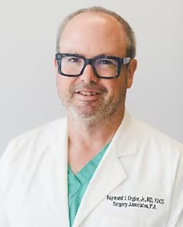



Summary
While hernias are usually not life-threatening, you should not ignore them. Hernia repair is one of the most common surgical procedures performed.
Hernias are a common medical condition that occurs when an organ, often in the abdomen, pushes through a weak spot in the surrounding muscle or connective tissue.
From a surgical standpoint, both the diagnosis and repair of hernias are critical to prevent complications such as pain or strangulation—a condition where the blood supply to the herniated tissue is cut off, leading to tissue death.
Diagnosis
Diagnosing a hernia usually begins with a physical examination. Surgeons typically look for a visible bulge in the affected area, which may become more pronounced when the patient stands, coughs or strains. In some instances, the hernia can be pushed back into the abdomen through gentle pressure, although this is not a permanent solution.
If the hernia is not readily apparent through physical examination, imaging tests such as ultrasound, computed tomography (CT) scans, or magnetic resonance imaging (MRI) may be used to confirm the diagnosis. These imaging techniques help visualize the internal structures and provide detailed images of the hernia, assisting surgeons in planning the most appropriate surgical approach.
Surgical Repair
Hernia repair, also known as herniorrhaphy or hernioplasty, is one of the most common surgical procedures globally. The goal of surgery is to return the displaced organ or tissue to its proper position and reinforce the weakened muscle area to prevent recurrence.
Several surgical methods are used to achieve this:
- Open Hernia Repair: This traditional surgical method involves making a large incision near the hernia site. The surgeon then pushes the protruding tissue back into place and stitches the muscle wall, often with the addition of a synthetic mesh to strengthen the area and reduce the risk of recurrence. Open surgery is particularly effective for large or complex hernias.
- Laparoscopic Hernia Repair: A minimally invasive alternative to open surgery, laparoscopic hernia repair involves making several small incisions in the abdomen. A laparoscope, a thin tube with a camera, is inserted through one of these incisions, allowing the surgeon to view the hernia on a monitor. Surgical tools are inserted through the other incisions to repair the hernia using mesh. This technique often results in less postoperative pain and quicker recovery compared to open surgery, making it preferable for many patients.
- Robotic-Assisted Hernia Repair: A more recent advancement, robotic surgery offers surgeons enhanced precision through 3D visualization and improved dexterity. The surgeon controls robotic arms equipped with surgical instruments, providing high accuracy in hernia repair. This method can be especially beneficial for complex hernia repairs or those located in difficult-to-reach areas.
Postoperative Care & Considerations
Regardless of the method used, postoperative care is crucial for successful recovery. Patients are advised to avoid strenuous activities and heavy lifting for a few weeks after surgery to allow the surgical site to heal properly. Pain management, often involving medications, is important to enhance comfort during recovery.
In summary, hernia repair is a critical surgical intervention that requires careful diagnosis and tailored surgical approaches to ensure optimal outcomes. With advancements in surgical techniques, patients now benefit from reduced recovery times and lower recurrence rates, improving overall quality of life after surgery.


Raymond Orgler, MD
Dr. Orgler is a surgeon at Surgery Associates and the Vein Center. He graduated with honors from the University of Mississippi School of Medicine. He completed a surgery internship and residency at the University of Arkansas for Medical Sciences and began practicing in 2002. He is certified by the American Board of Surgery and is a Fellow of the American College of Surgeons. His expertise and special interest is in all facets of general, breast, colorectal, hernia, venous, robotic and laparoscopic surgery.
Call 1-800-THE DESK (1-800-843-3375) or use our search to find a provider near you.

Subscribe to Our Newsletter
Like this content and want to get more? Sign up for True North, the health and wellness newsletter from North Mississippi Health Services!

Subscribe to Our Newsletter
Like this content and want to get more? Sign up for True North, the health and wellness newsletter from North Mississippi Health Services!

Nurse Link®
Not sure if you need Urgent Care or the ER? Call 1-800-882-6274 anytime to speak directly to a registered nurse and get immediate answers. Using computerized medical protocols, nurses direct callers to the most appropriate treatment. Our nurses are available 24 hours per day, seven days per week.